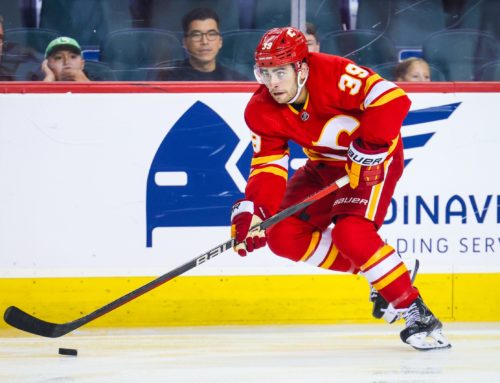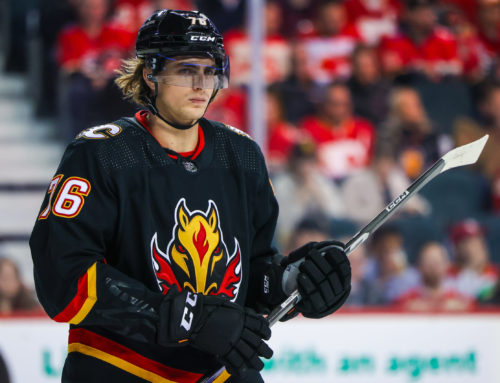If you are in keeper or dynasty leagues, "thirty" is a bad word. Owners will sell off players for pennies on the dollar because they are on the brink of decline. A lot do. There is intelligence to this mindset, but it has limits.
Owners spend countless amounts of time searching for that next breakout player and often will skip over that veteran sitting at the top of the waiver wire because he is 32 or 35 or dare it be said, older. When this trend occurs in your pool, you need to exploit it. Those old guys that recover from nagging injuries and/or adjust their training to better suit their aging body can find a resurgence back io fantasy relevance.
That is what is occurring with Jeff Carter, 36, with the Los Angeles Kings. The last two years Carter has been a massive disappointment to fantasy owners in all formats. Unless your league is deep, 14 teams or more, he has probably been unowned for the past season, maybe even the last two.
In 2017-18, Carter only played six games before suffering a lacerated (torn) ankle tendon. Upon return, he put up 19 points in the final 22 games of the season.
All things pointed to Carter just being Carter. However, in 2018-19 he was clearly not the same player producing only 33 points in 76 games. This was the first time in his career he averaged under 0.5 points per game. After witnessing Erik Karlsson and Vincent Trocheck go through injuries related to their ankles in recent years, it would seem there are long-term lingering affects on recovery.
There are two types of injury recovery: 1) enough to get back on the ice, and 2) full recovery. The second takes a lot longer than simply getting cleared to return to game action. Rebuilding that strength, flexibility, dexterity, and most importantly to trust in that injured body part takes time.
It doesn't take fancy stats or a lot of digging to know Carter was suffering something in 2018-19. Whether it was a second undisclosed injury or lingering affects from his ankle tendon injury, his production fell inexplicably off a small cliff. His shots on goal fell by from 3.14 in 2018-19 to 2.29 per game. That's 60-70 shots. His shooting percentage also fell off. His career shooting percentage is 11.2%. In 2017-18 it dropped to 7.5%. This is the difference between Carter scoring 13 goals and 26 goals.
In 2019-20, Carter returned to his 3 SOG-per-game pace, his shooting percentage recovered a bit to 9.6%, but the points didn't come. The Kings weren't exactly a good team either. And then Carter suffered another major injury, ending his season after 60 games. Ten games later, COVID hit. In June 2020, Carter opted for surgery to fix a core muscle injury.
Carter was able to focus on rehab and recovery without the pressures of trying to be ready for training camp in September. With delay after delay to the start of the NHL season, Carter was provided the opportunity to properly rehab and heal from the surgery.
Carter started 2020-21 with one goal, five assists and 25 shots in his first eight games. It is a small sample, but with only 56 games he's already 14% through the season. With a shooting percentage of 4%, a PDO OF 957, and Carter back on his career norm of 2.6 points per 60, there is a lot of reason to believe he will return to his career 0.75 point per game pace.
There is one red flag that could create a drag on his stats as the season wears on. Eight games in, Carter is sitting with a career low of 0.39% OZ starts. This is a full 10% lower than any previous season of his career. Now at age 36, his responsibilities are changing. He's being relied on to reduce opposition scoring chances more than ever.
There is also a huge shift with Jeff Carter of 2020-21 versus the Jeff Carter of 2006-2020. He has been moved to the wing full time. This gives him the added bonus to fantasy owners of holding triple position eligibility: C, LW, RW. He is averaging 2.5 face-offs per game, which is a far cry from his career average of 12.4 faceoffs per game. He has been a really good player for 14 years, so at 36 it is only natural that he has lost a step or half a step to the pace of his game.
In 2017-18 Claude Giroux was moved to the wing in Philadelphia after watching his production decrease year over year to a low of 58 points in 2016-17. So it seems Carter is being provided the Giroux treatment in LA this season. It makes sense, since if he is losing a step, moving him to wing reduces the amount of skating and responsibility required during each shift.
By all appearances, Carter is on a very sustainable 35–40-point pace with 3+ shots per game and still averaging close to a hit per game. The last two seasons of poor production seem to be a product of lingering injuries rather than Carter's quality of play falling off a cliff. Until the injury in 2017, he had been one of the most consistent plug-and-play forwards of the past decade. He was a player you could take in middle to second half of a draft and be able to predict with confidence: 30 goals, 60-plus points, 240-ish shots, 40 penalty minute and 80 hits over 82 games.
Carter is spending the majority of his power play time on the second unit. Spending time away from Anze Kopitar on the power play doesn't help his production levels. That said, Adrian Kempe is not a player that cannot be replaced if the power play becomes stagnant. Carter is the most likely candidate to move back onto the first unit and has spent a couple shifts on the first power play this year (1:31 in total).
With the move to wing, plug him back in to hit just below his career averages. Boring can be good. Carter has a very safe floor between 32-35 points this year. Keep an eye on his offensive zone starts. If this increases closer to 50% his ceiling rises to low 40's point production – 17 goals, 36 points, and 160 shots is a respectable stat-line for a player the fantasy world thought was washed up only months ago. It's good to have Jeff Carter back.





 EDM
EDM TOR
TOR PIT
PIT VAN
VAN FLA
FLA MIN
MIN DET
DET COL
COL WSH
WSH
